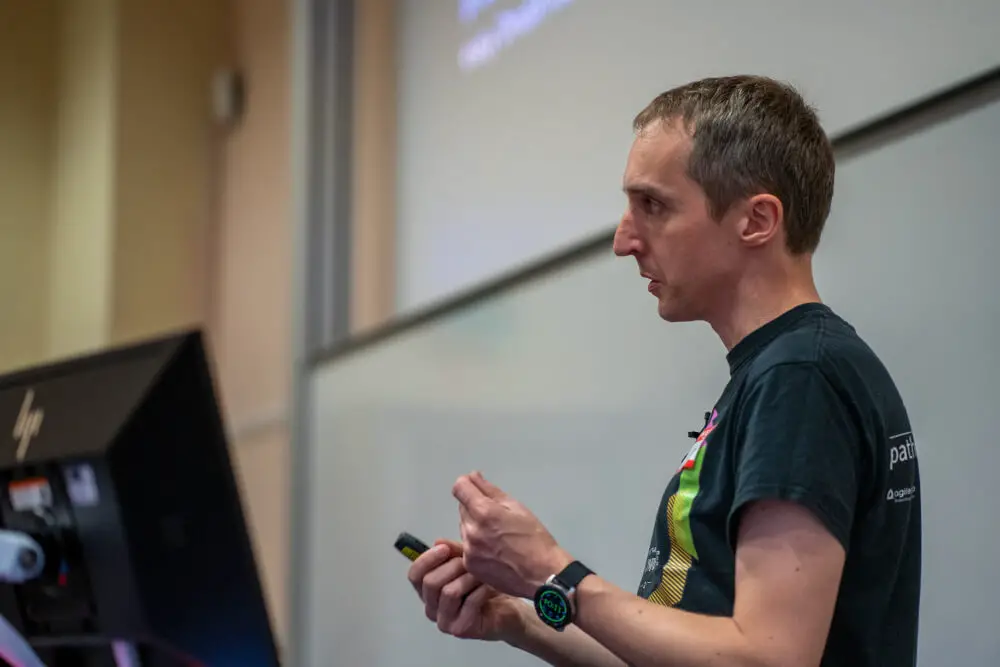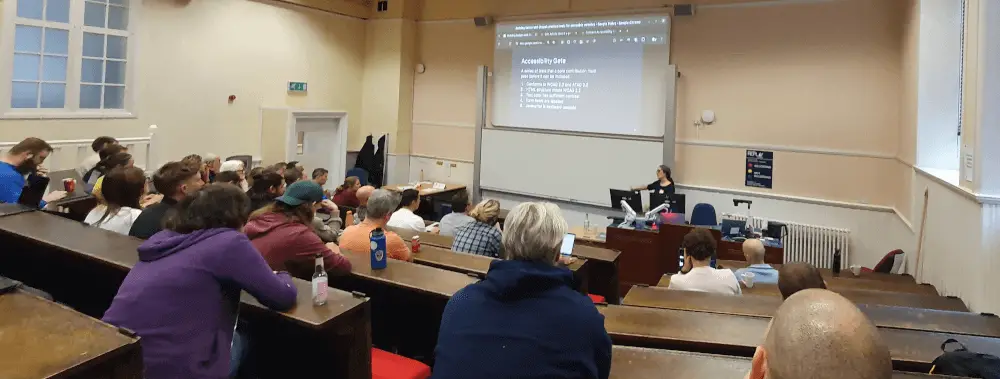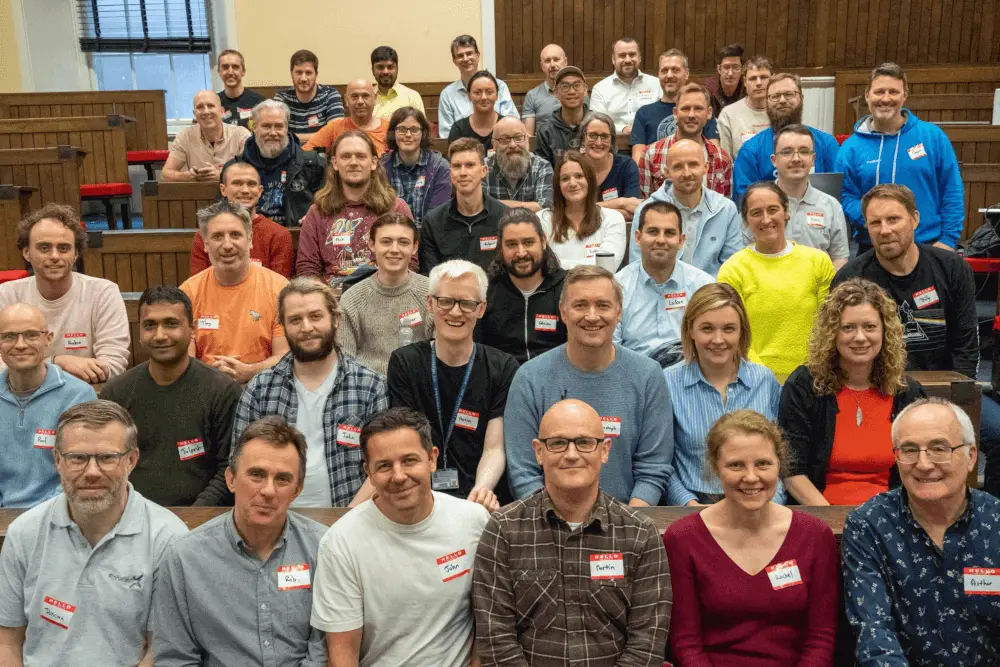DrupalCamp Scotland returned after a small hiatus of 5 years on the 25th October 2024, and saw nearly 50 people attend the university of Edinburgh Paterson's Land building for a day of talks and sessions. I had the honor of being invited to speak at the conference, which was the first physical speaking session I've had since 2019.
I arrived early to the conference on a sunny Friday morning after driving up the night before. After a cup of coffee and a lovely chat with the organisers and the first few attendees to arrive we started the conference.
The opening talk was from Billy Wardrop, who is Web Development Team Manager in University of Edinburgh. In his talk, A 7 year journey from Drupal 7 to Drupal 10 and what we learned migrating over 600 websites, he went through the lessons he had learned in that migration. This was a fascinating run through of all of the challenges that a web master faces and the history of the migration to Drupal 10 for the University of Edinburgh. It also highlighted the challenges of migrating hundreds of websites from different university departments away from their random systems and into a decent managed Drupal environment. Of particular interest was the talk about deployments as I have faced similar challenges with just 20 sites in the same system.
Next on the agenda was me! I have been writing a lot about the Batch API recently so I decided that I should probably conclude this series of articles with a talk on An Introduction to the Drupal Batch API. Thankfully, I had the week before the conference off, which gave me some time to prepare both the talk and the accompanying code examples.
I think the talk went really, well. It took me a minute or two to get into it, but I soon found my flow and was talking through the slides and demos. I had a few people come up to me afterwards saying that it was a good talk (some people said excellent) and that they learned lots.
If you want to learn more about my talk then the slides are available on GitHub, as is all the code for the examples I ran through on the day. There's also a bunch of articles on this site to do with the Batch API, but I would suggest starting with an introduction to the Batch API.

After my talk we had a (much needed) coffee break before heading into the next session.
This was Lenny Moskalyk who talked about How I turned my hobby into my job or why Drupal community is addictive. Lenny looked at her start in the Drupal community and how she stuck around because of the friends she made, which has recently lead to her being involved in the Drupal CMS/Starshot initiative. She talked about the "adopt a document" scheme, where a company sponsors a page or section of documentation on drupal.org and works to improve it, a scheme I can fully get behind.
Of particular interest, however, was the concept of Open University in Drupal. If you are reading this in the UK, this isn't that Open University, it just happens to have the same name at the moment. The concept was that a 3 week full time Drupal course has been created, and this is forming the basis of Drupal training courses. I can appreciate this as key to Drupal's continued existence is driving the incoming talent to the community and making sure they know everything they need to get Drupal jobs. The ultimate goal is to produce a Drupal certification. Having taught a few Drupal apprentices and lead a number of training sessions this is completely something I can get behind. I will be watching this with great interest and hope to contribute some of my own resources to the program.
Next up was Emma Horrell, who is User Experience Team Manager at the University of Edinburgh. She was talking about Opening up Drupal’s terminology which is a (more or less) recent effort from the community on reducing the complexity of language in Drupal. Emma talked about "Drupalisms" and the Drupal jargon that tends to either confuse or bewilder users who come across it. The Drupal CMS/Starshot initiative is a huge opportunity to tidy up the language in Drupal and so Emma and the De-jargoning Drupal initative have been working to catalog and translate the confusing text. Emma referred to this as opening up a can of worms and mentioned that the spreadsheet used to catalog the interface elements was thousands of lines long and took a long time to put together.
De-jargoning Drupal can only be a good thing for Drupal, especially for end the users. When talking to clients I often avoid using words like "node" and "paragraph" as these terms often cause some confusion so I can appreciate the drive to do something about it.

Lunch consisted of a collection of lunch box/trays with a selection of different elements in them. All of them were vegan and so it was just a case of picking a box and eating it. They were pretty tasty!
After lunch we had Building better with Drupal: practical tools for accessible websites with Maria Young. This was a great overview of why accessibility is important and including an overview of systems like WCAG and the European Accessibility Act (EAA). The important message was that systems like WCAG are the baseline, and that you should be making much more effort to make your websites as accessible as possible.
Maria went through how to bake accessibility into Drupal sites, including adding modules like Editoria11y that allow your Drupal sites to remain accessible as your users edit content. Editoria11y is a powerful module that I have used on a number of client sites, although I have found it also good to ensure that it is difficult to bypass accessibility features. A sentiment that Maria also established in her session. This was an interesting session and I learnt a few things about accessibility.
This was followed by Christoph Breidert, who was talking about AI with Drupal - How to build useful applications for your clients. Christoph looked at using statistical based text generation systems like Large Language Models (LLMs) to generate text content, using the talks at the camp as a basis. This talk featured a demo where Christoph used the LLM system GPT-40-mini, which is a small language model, to create a rundown of the camp talks. He then used Retrieval Augmented Generation (RAG) to reduce the amount of data being sent to the LLM and produce much finer results from the model than before. The process it to take the prompt, perform a search, and feed the results of the search into the LLM to generate fine tuned results. Christoph recommended producing the results as markdown, which would allow the results to be interpreted in different ways. This was a really interesting talk and made me re-think some of my assumptions about using AI and LLMs in Drupal.
After a quick break (which included some cakes) we saw Aaron Hirtenstein talk about Microsites in LocalGov Drupal. LocalGov Drupal is now used on more than 50+ council sites and is growing every week. This talk focused on the microsites feature that has been built using the Group and Domain modules to create a fully featured site sub-section. This solves the issue where the main council site was managed by Drupal, but sub-sites were often setup using a variety of different technologies and systems, which meant they were often un-managed. Maria Young, who works with Agile Collective (who are a major contributor to the LocalGov Drupal) along with Aaron, also spoke briefly about the use cases for this system before we heard saw a recording of Finn Lewis talking about the Micosites system at DrupalCon Barcelona.
The final talk of the day was Rouven Volk with Scaling Drupal in the Real World: Practical Insights for Large Organisations. This was an interesting talk about how to adapt to change and use Drupal as a framework for re-use, rather than re-inventing everything over and over again. Drupal can also fit into the organisation, rather than the organisation fit into Drupal, which is what makes Drupal such a well used tool. Key to this is investing in Drupal. A quote from the talk was "technology helps you save money, that's why you have to invest in it", so although Drupal is "free", you must invest in it to make it work.

After this, in fine DrupalCamp tradition, we disembarked to the pub and celebrate the day and meet everyone.
This was a really really well planned camp, especially considering that it was organised in only a month or two. I was made to feel very welcome by the team behind the camp, who did an amazing job of making sure the speakers had everything they needed. The low number of attendees actually made the camp feel much more friendly as everyone made the effort to chat with everyone else present.
I was blown away to be asked to present and I was really happy that the talk went well and seemed to resonate with different people. Thank you to those people who thanked me for the talk and chatted about batch processing in Drupal and #! code. You really made my day!
Many thanks to Paul Johnson for taking some amazing pictures of the camp over the weekend. He actually took a good picture of me, which you can see above.




Add new comment